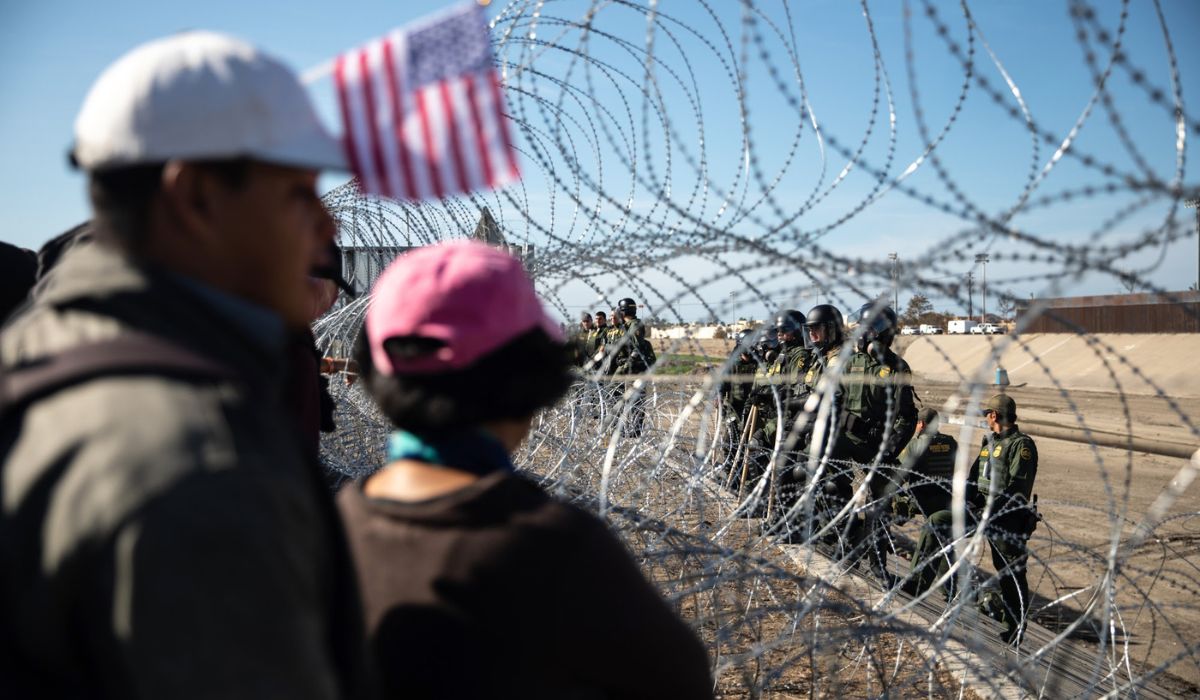In late January, Texas Congressman Joaquin Castro called on President Biden to invoke the Insurrection Act in response to the ongoing standoff between Texas Gov. Greg Abbot and the federal government over border enforcement. Abbot remains defiant, having announced in recent days the construction of a military base to house national guard troops the federal government says have prevented Customs and Border Patrol (CBP) from accessing stretches of the border. Yet, according to the Brennan Center’s Joseph Nunn, invoking the Insurrection Act at this stage — as the standoff makes its way through the courts — would set a dangerous precedent, lowering the threshold for future presidents eager to involve the military in civilian affairs.
What is the Insurrection Act? And when has it been applied?
The Insurrection Act is the primary tool that allows the president to use the military domestically to do law enforcement in the event of some sort of crisis that overwhelms civilian authorities. That’s the idea. In the event of a massive insurrection where the authorities in a state are overwhelmed, the president can invoke the Insurrection Act and deploy the military to suppress that insurrection or to enforce the law if it’s being obstructed en masse by private citizens. In that instance, you can think about the terrorist insurgency waged by the Ku Klux Klan during Reconstruction. The Insurrection Act was used to quell that. It also allows the president to send in the military to enforce the law if a state is obstructing the enforcement of federal law. So, when President Eisenhower sent paratroopers into Little Rock, Arkansas to escort the Little Rock Nine into Little Rock Central High School, that was through the Insurrection Act. Those are the scenarios it’s designed to respond to. But at its core, what it’s doing is it allows the military to be deployed domestically to enforce civilian laws. Now obviously, that is a grave and significant authority that you would want to be subject to narrowly tailored restrictions to make sure it isn’t abused. Unfortunately, it’s not. Because the other thing the Insurrection Act is, is a blank check. It gives the president essentially unlimited discretion to use the military as a domestic police force. There are quite literally no safeguards … the president alone decides whether a given circumstance warrants invoking the Insurrection Act.
The examples you give suggest the Insurrection Act has been used, at least in recent memory, largely to enforce civil rights law. Is that correct?
For much of early American history it was used for insurrections. Part of the legal authority that allowed Abraham Lincoln to prosecute the Civil War was the Insurrection Act. In the latter part of the 19th Century, you start to see two things happen simultaneously. One is the increasing use of the Insurrection Act for what we would call civil rights enforcement, attempting to protect – particularly in former Confederate states – African Americans and their voting rights. Also, out West, to protect Chinese immigrants from anti-Chinese white mobs that were physically trying to expel them. This pattern continues into the 20th Century … but the Insurrection Act has not been used for civil rights enforcement since 1965, when President Lyndon Johnson invoked it to protect the Freedom Riders in Alabama. Every subsequent invocation, and there are only about half a dozen, have been in response to civil unrest. And particularly it’s been used to quell civil unrest in cities with large African American populations that had been victimized by systemic racism. You have the 1967 Detroit Riots, and similarly in 1992 in Los Angeles. The thing to understand about the Insurrection Act is yes, there is a history of using the Act to protect the rights of marginalized communities. There is absolutely a history of that running from the Civil War through the 1960s. But every post-1965 invocation has been really to send the military into majority or plurality Black cities to put down unrest.
Reporting suggests a team of Trump advisors are now hashing out plans for his second term that envision sweeping use of the Insurrection Act. What are your concerns there?
It is absolutely the case that Trump and his advisors have expressed an intent to more aggressively use the military for domestic law enforcement if he is reelected to a second term. In some cases, they have talked explicitly about using the Insurrection Act. Former Trump advisor Stephen Miller has talked about a plan to use the military to support a program of mass deportations. In an interview last fall, he discussed using red state’s National Guard troops to assist. Say the president – whoever they are – wants to detain undocumented immigrants in Indiana, and he wants to use the military to do so. There are several ways he can do it. He can suggest the governor of Indiana do it himself with his own National Guard. He could also, under what’s known as Title 32 Status, ask the governor of Indiana to deploy the National Guard and the federal government would foot the bill. With Title 32, the National Guard is still under state command and control, but they are paid with federal funds, and they receive federal benefits. And, relevant here, they can be used for federal missions carried out at the request of the president or secretary of defense. So, suppose the president wants to arrest undocumented immigrants in Kentucky and wants to use the Indiana National Guard. If the governor of Kentucky consents, the president can use Title 32 status. But suppose the president wants to make those same arrests in Illinois, specifically in Chicago. And assume the governor of Illinois says no. If the president were to ask the governor of Indiana to send the Indiana National Guard into Illinois… and the governor of Illinois objected, that would be unlawful. They could not do that. But this is the plan Miller laid out.
The portrait you paint lays the grounds for potentially serious civil conflict. It’s chilling.
We haven’t even gotten to the chilling part yet.
I’m not sure I want to.
The chilling part is that, if we go back to the example of Illinois, if the president invokes the Insurrection Act, he can do whatever he wants. He can federalize the Illinois National Guard and instruct them to arrest undocumented immigrants. He can federalize the Indiana National Guard, whether or not the governor of Indiana is willing, and send them to do it. He can also send members of the active-duty armed forces to Chicago to arrest undocumented immigrants. The Insurrection Act puts no limits on the type of troops that are used once its invoked. The president can send military police. He can also send the first armored division. And this would probably be lawful, because the Insurrection Act makes the president the sole judge of whether a given situation warrants invoking it.
Yet some are calling on Biden to invoke the Insurrection Act in response to Texas’ usurpation of border enforcement. You say that’s a bad idea.
While it would almost certainly be legal, it would not be appropriate. In the US, when a state and the federal government disagree, they solve those disputes in court. And until recently, the Biden administration has not aggressively asserted federal authority in court. Which is to say, there is a lot of room left to litigate here. It would be inappropriate to jump from doing very little to invoking the Insurrection Act. The other reason has to do with a principle that can be traced to the Constitution, that the military should not be interfering in the affairs of civilian government except in an emergency. A lot of comparisons have been made between what’s happening in Texas and what happened in Arkansas in 1957. In the latter case, President Eisenhower waited until a federal judge exhausted all the legal means available to him to see that federal law was enforced. But Eisenhower also waited until there was a clear and imminent threat of anti-Black mob violence. He treated the Insurrection Act as a last resort and that is the way it should be. Any president should be cautious about doing anything to lower the threshold of using the Insurrection Act, particularly when we have a presidential candidate waiting in the wings who is reportedly planning to invoke it potentially as soon as he comes into office.
The Brennan Center has proposed amending the Insurrection Act. What would that look like?
Our proposal would completely repeal the Insurrection Act and replace it with something entirely new. The three critical things that need to happen are: the reform needs to narrow and clarify the criteria for deployment. There needs to be clear criteria and they need to be narrow, limiting the Act’s use to real emergencies. The second thing is that reform needs to bring Congress and the Courts into the process so they can act as a check against misuse of the Insurrection Act. That means judicial review by the courts, but also a time limit on the use of the Insurrection Act that can only be extended by Congress. Finally, limit what the military can do once deployed, which is something that is completely absent from the Act as it is. With the Congress we have, there is no doubt this reform is an uphill challenge. But there are calls for reform coming from voices in the conservative legal establishment. There is a bipartisan understanding that the Insurrection Act is really a disaster waiting to happen. And that we have been remarkably lucky for the past 150 years that the Act has not been misused more frequently.
Joseph Nunn is counsel in the Brennan Center’s Liberty and National Security Program. He focuses on issues surrounding the domestic activities of the U.S. military, including the Insurrection Act, the Posse Comitatus Act, National Guard deployments, and martial law. is the co-author of “An Army Turned Inward: Reforming the Insurrection Act to Guard Against Abuse” (Journal of National Security Law and Policy, 2023) and author of the Brennan Center report Martial Law in the United States (2020).





